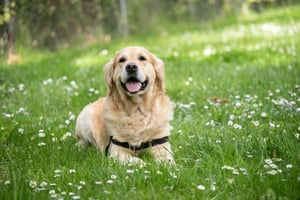Learning how to stop your puppy from biting is an essential part of being a responsible pet owner....
How to Stop Puppy Biting: Effective Strategies and Tips
Training your puppy not to bite is an essential step to ensure a happy, healthy relationship between you and your pet. It requires patience, dedication, and some clever strategies. In this article, we’ll discuss the most effective methods for teaching your puppy not to bite, from using positive reinforcement to providing plenty of chew toys and exercise. We’ll also provide tips on how to respond if your puppy does bite and how to prevent the behavior from occurring in the first place.
Understanding Why Puppies Bite
Before you can teach your puppy not to bite, it’s important to understand why they do it in the first place. Puppies bite for a variety of reasons, including teething, exploring their environment, and play. In most cases, biting is a normal behavior, and it’s important to remember that puppies don’t know any better. They’re simply exploring and learning about their world.
That said, it’s still important to teach your puppy not to bite, as it can lead to serious injuries. Puppies have sharp teeth and powerful jaws, and they can easily break skin and cause lasting damage. That’s why it’s so important to teach your puppy not to bite as soon as possible.
Using Positive Reinforcement
Positive reinforcement is one of the most effective methods for teaching your puppy not to bite. This involves rewarding them with treats, praise, and attention when they display the desired behavior. For instance, if your puppy stops biting when you say “No”, give them a treat and tell them what a good job they did.
Positive reinforcement is a great way to teach your puppy not to bite because it encourages them to repeat the desired behavior. It also helps to build a strong bond between you and your pet, which can make training much easier.
Provide Plenty of Chew Toys
Puppies love to chew, and providing them with plenty of chew toys can help to redirect their biting behavior. Chew toys are a great way to keep your puppy occupied and help to satisfy their need to chew. Look for toys that are specifically designed for puppies, as they’re less likely to be a choking hazard.
It’s also important to monitor your puppy when they’re playing with their toys. If they start to bite or chew on something they shouldn’t, take the toy away and replace it with a chew toy. This will help to reinforce the idea that biting and chewing on inappropriate objects is not acceptable.
Provide Plenty of Exercise
Exercise is an essential part of any puppy’s life, and it can help to reduce their need to bite. Exercise helps to release energy and can help to keep your puppy calm and relaxed. Aim for at least 30 minutes of exercise per day, and make sure to take your puppy for regular walks.
You can also incorporate playtime into your puppy’s exercise routine. Playing games like fetch and tug-of-war can help to keep your puppy active and can also help to redirect their biting behavior.
How to Respond if Your Puppy Bites
No matter how much you’ve trained your puppy not to bite, it’s inevitable that they will slip up from time to time. It’s important to respond quickly and firmly when your puppy bites. Immediately stop whatever you’re doing and say “No” in a firm voice. Then, remove yourself from the situation and ignore your puppy for a few minutes. This will help to teach them that biting is not acceptable behavior.
It’s also important to be consistent when responding to biting. If you respond inconsistently, your puppy won’t learn what’s expected of them.
Preventing Biting
The best way to teach your puppy not to bite is to prevent the behavior from occurring in the first place. Here are a few tips for preventing biting:
- Supervise your puppy: Make sure to keep an eye on your puppy when they’re playing. If you notice them starting to bite, redirect their attention to a chew toy.
- Provide plenty of chew toys: Make sure to provide your puppy with plenty of chew toys to keep them occupied.
- Avoid rough play: Rough play can encourage biting, so avoid playing games like tug-of-war or wrestling with your puppy.
- Be consistent: Make sure you’re consistent in your responses to biting. If you respond inconsistently, your puppy won’t learn what’s expected of them.
Conclusion
Training your puppy not to bite is an essential part of responsible pet ownership. It requires patience, dedication, and some clever strategies. The most effective methods for teaching your puppy not to bite include using positive reinforcement, providing plenty of chew toys and exercise, and responding quickly and firmly when they do bite. Additionally, it’s important to prevent biting by supervising your puppy, providing plenty of chew toys, avoiding rough play, and being consistent in your responses. With patience and dedication, you can teach your puppy not to bite and enjoy a happy, healthy relationship with your pet.



